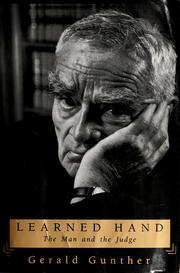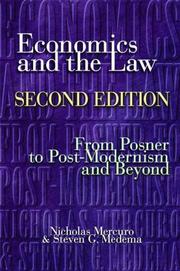| Listing 1 - 6 of 6 |
Sort by
|

ISBN: 0674518802 Year: 1994 Publisher: Cambridge, Mass. Harvard University Press
Abstract | Keywords | Export | Availability | Bookmark
 Loading...
Loading...Choose an application
- Reference Manager
- EndNote
- RefWorks (Direct export to RefWorks)
Book
ISBN: 1421432110 1421432137 1421432129 Year: 2019 Publisher: Johns Hopkins University Press
Abstract | Keywords | Export | Availability | Bookmark
 Loading...
Loading...Choose an application
- Reference Manager
- EndNote
- RefWorks (Direct export to RefWorks)
Originally published in 1970. This is a study of one of the most highly respected tribunals in the history of the English-speaking world—the United States Court of Appeals for the Second Circuit. Situated in Manhattan, the Second Circuit Court, serving New York, Connecticut, and Vermont, is the most important commercial court in the country. But, like other inferior courts, it has never been studied in depth. Marvin Schick provides a comprehensive analysis. From 1941 to 1951, Learned Hand presided over the Second Circuit as chief judge, and the court bore his stamp. But on its bench sat other men of great competence, judges Thomas W. Swan, August N. Hand, and Harrie B. Chase, as well as Charles E. Clark and Jerome N. Frank, whose constant disagreement characterized much of the court's work. Schick studies the Second Circuit Court from several angles: historical, biographical, behavioral, and case analytical. He tells a history of the court from its origins in 1789. He provides biographical sketches of the six judges who sat during Learned Hand's tenure as chief judge. He analyzes the many decisions handed down by the court, including the precedent setters. He examines the court's decision-making process, especially its unique procedures such as the memorandum system, which requires from the judges "preliminary opinions" in the cases they hear. A novel feature of this book is the correlation of votes of the Second Circuit judges with subsequent decisions of the Supreme Court.Schick was aided in his study by having access to the private papers of Judge Clark. These thousands of memoranda and letters throw much light on the workings of the Second Circuit Court and reveal the bargaining that went on among the judges in difficult cases. The Clark papers make possible a clearer understanding of the incessant conflict between Clark and Frank and show how this unusual relationship gave vitality to the Second Circuit.
Book
ISBN: 0199869375 1283115832 9786613115836 0199703434 9780199869374 Year: 2011 Publisher: Oxford ; New York : Oxford University Press,
Abstract | Keywords | Export | Availability | Bookmark
 Loading...
Loading...Choose an application
- Reference Manager
- EndNote
- RefWorks (Direct export to RefWorks)
Billings Learned Hand was one of the most influential judges in America. The author procides a complete account of the professional and personal life of leanred hand, conveying the substance and range of his judicial and intellectual contributions.
Judges --- Hand, Learned, --- United States. --- Hand, Billings Learned,
Book
ISBN: 019998638X 019998705X 0190260130 Year: 2013 Publisher: Oxford : Oxford University Press,
Abstract | Keywords | Export | Availability | Bookmark
 Loading...
Loading...Choose an application
- Reference Manager
- EndNote
- RefWorks (Direct export to RefWorks)
Judge Learned Hand is an icon of American Law. Though he was never nominated to the U.S. highest court, Hand is nevertheless more frequently quoted by legal scholars and in Supreme Court decisions than any other lower court judge in U.S. history. He was the model for all judges who followed him, setting the standard for the bench with a matchless combination of legal brilliance and vast cultural sophistication. Hand was also renowned as a superb writer. This book offers a sampling of the correspondence between Hand and an array of intellectual and legal giants.
Judges --- Hand, Learned, --- Alcaldes --- Cadis --- Chief justices --- Chief magistrates --- Justices --- Magistrates --- Courts --- Legal status, laws, etc. --- Officials and employees --- Hand, Billings Learned,
Book
ISBN: 0691216010 Year: 2006 Publisher: Princeton, New Jersey : Baltimore, Md. : Princeton University, Project MUSE,
Abstract | Keywords | Export | Availability | Bookmark
 Loading...
Loading...Choose an application
- Reference Manager
- EndNote
- RefWorks (Direct export to RefWorks)
This is an expanded second edition of Nicholas Mercuro and Steven Medema's influential book Economics and the Law, whose publication in 1998 marked the most comprehensive overview of the various schools of thought in the burgeoning field of Law and Economics. Each of these competing yet complementary traditions has both redefined the study of law and exposed the key economic implications of the legal environment. The book remains true to the scope and aims of the first edition, but also takes account of the field's evolution. At the book's core is an expanded discussion of the Chicago school, Public Choice Theory, Institutional Law and Economics, and New Institutional Economics. A new chapter explores the Law and Economics literature on social norms, today an integral part of each of the schools of thought. The chapter on the New Haven and Modern Civic Republican approaches has likewise been expanded. These chapters are complemented by a discussion of the Austrian school of Law and Economics. Each chapter now includes an "At Work" section presenting applications of that particular school of thought. By providing readers with a concise, noncritical description of the broad contours of each school, this book illuminates the fundamental insights of a field with important implications not only for economics and the law, but also for political science, philosophy, public administration, and sociology.
Derecho y economía. --- Derecho --- Aspecto económico. --- Becker, Gary. --- Buchanan, James M. --- Calabresi, Guido. --- Coase theorem. --- Fifth Amendment. --- Hand, Learned. --- Hovenkamp, Herbert. --- Journal of Legal Studies. --- Keynesian macroeconomics. --- Knight, Frank. --- allocative efficiency. --- catallaxy approach. --- compensation principle. --- deductive thinking. --- dispute-resolution. --- duality theorem. --- economic imperialism. --- efficiency concept. --- expectation damages. --- fairness arguments. --- individual behavior. --- justice. --- legal doctrines. --- liquidated damages. --- majority rule. --- microeconomics. --- optimal majority.

ISBN: 9780691125725 0691125724 0691216010 Year: 2006 Publisher: Princeton, New Jersey : Baltimore, Md. : Princeton University, Project MUSE,
Abstract | Keywords | Export | Availability | Bookmark
 Loading...
Loading...Choose an application
- Reference Manager
- EndNote
- RefWorks (Direct export to RefWorks)
This is an expanded second edition of Nicholas Mercuro and Steven Medema's influential book Economics and the Law, whose publication in 1998 marked the most comprehensive overview of the various schools of thought in the burgeoning field of Law and Economics. Each of these competing yet complementary traditions has both redefined the study of law and exposed the key economic implications of the legal environment. The book remains true to the scope and aims of the first edition, but also takes account of the field's evolution. At the book's core is an expanded discussion of the Chicago school, Public Choice Theory, Institutional Law and Economics, and New Institutional Economics. A new chapter explores the Law and Economics literature on social norms, today an integral part of each of the schools of thought. The chapter on the New Haven and Modern Civic Republican approaches has likewise been expanded. These chapters are complemented by a discussion of the Austrian school of Law and Economics. Each chapter now includes an "At Work" section presenting applications of that particular school of thought. By providing readers with a concise, noncritical description of the broad contours of each school, this book illuminates the fundamental insights of a field with important implications not only for economics and the law, but also for political science, philosophy, public administration, and sociology.
Law and economics --- Law and economics. --- AA / International- internationaal --- 340.0 --- 340.115 --- Economics and jurisprudence --- Economics and law --- Jurisprudence and economics --- Economics --- Jurisprudence --- Recht: algemene werken en handboeken. --- Recht: algemene werken en handboeken --- Derecho y economía. --- Derecho --- Becker, Gary. --- Buchanan, James M. --- Calabresi, Guido. --- Coase theorem. --- Fifth Amendment. --- Hand, Learned. --- Hovenkamp, Herbert. --- Journal of Legal Studies. --- Keynesian macroeconomics. --- Knight, Frank. --- allocative efficiency. --- catallaxy approach. --- compensation principle. --- deductive thinking. --- dispute-resolution. --- duality theorem. --- economic imperialism. --- efficiency concept. --- expectation damages. --- fairness arguments. --- individual behavior. --- justice. --- legal doctrines. --- liquidated damages. --- majority rule. --- microeconomics. --- optimal majority. --- Aspecto económico.
| Listing 1 - 6 of 6 |
Sort by
|

 Search
Search Feedback
Feedback About UniCat
About UniCat  Help
Help News
News